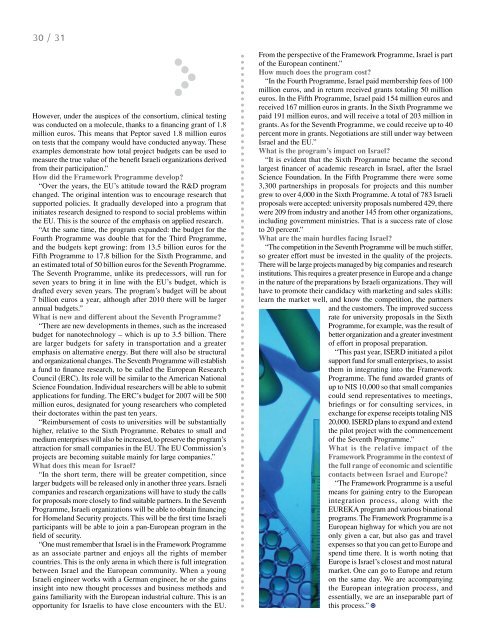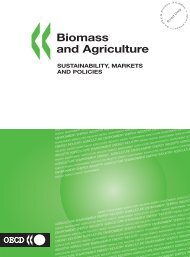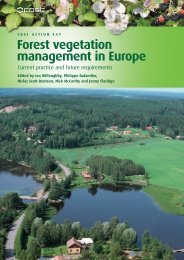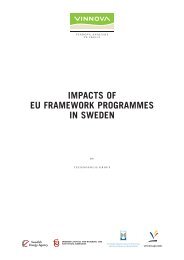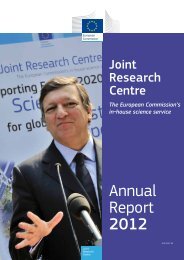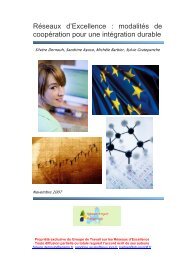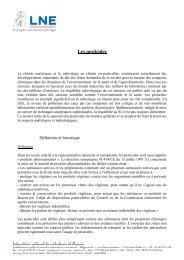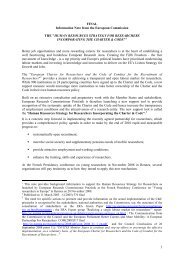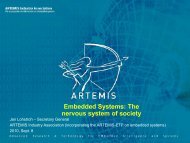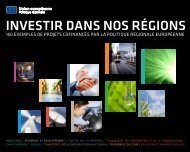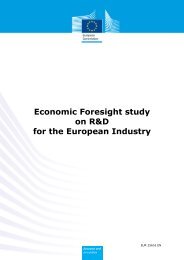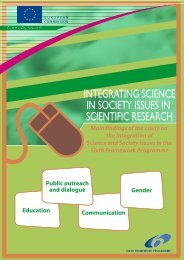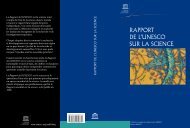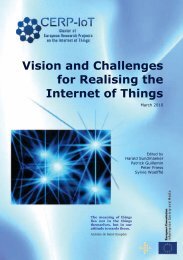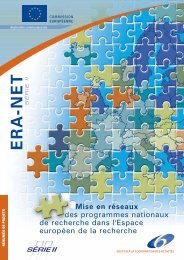Télécharger le document - Eurosfaire
Télécharger le document - Eurosfaire
Télécharger le document - Eurosfaire
You also want an ePaper? Increase the reach of your titles
YUMPU automatically turns print PDFs into web optimized ePapers that Google loves.
30 / 31<br />
However, under the auspices of the consortium, clinical testing<br />
was conducted on a mo<strong>le</strong>cu<strong>le</strong>, thanks to a financing grant of 1.8<br />
million euros. This means that Peptor saved 1.8 million euros<br />
on tests that the company would have conducted anyway. These<br />
examp<strong>le</strong>s demonstrate how total project budgets can be used to<br />
measure the true value of the benefit Israeli organizations derived<br />
from their participation.”<br />
How did the Framework Programme develop?<br />
“Over the years, the EU’s attitude toward the R&D program<br />
changed. The original intention was to encourage research that<br />
supported policies. It gradually developed into a program that<br />
initiates research designed to respond to social prob<strong>le</strong>ms within<br />
the EU. This is the source of the emphasis on applied research.<br />
“At the same time, the program expanded: the budget for the<br />
Fourth Programme was doub<strong>le</strong> that for the Third Programme,<br />
and the budgets kept growing: from 13.5 billion euros for the<br />
Fifth Programme to 17.8 billion for the Sixth Programme, and<br />
an estimated total of 50 billion euros for the Seventh Programme.<br />
The Seventh Programme, unlike its predecessors, will run for<br />
seven years to bring it in line with the EU’s budget, which is<br />
drafted every seven years. The program’s budget will be about<br />
7 billion euros a year, although after 2010 there will be larger<br />
annual budgets.”<br />
What is new and different about the Seventh Programme?<br />
“There are new developments in themes, such as the increased<br />
budget for nanotechnology – which is up to 3.5 billion. There<br />
are larger budgets for safety in transportation and a greater<br />
emphasis on alternative energy. But there will also be structural<br />
and organizational changes. The Seventh Programme will establish<br />
a fund to finance research, to be cal<strong>le</strong>d the European Research<br />
Council (ERC). Its ro<strong>le</strong> will be similar to the American National<br />
Science Foundation. Individual researchers will be ab<strong>le</strong> to submit<br />
applications for funding. The ERC’s budget for 2007 will be 500<br />
million euros, designated for young researchers who comp<strong>le</strong>ted<br />
their doctorates within the past ten years.<br />
“Reimbursement of costs to universities will be substantially<br />
higher, relative to the Sixth Programme. Rebates to small and<br />
medium enterprises will also be increased, to preserve the program’s<br />
attraction for small companies in the EU. The EU Commission’s<br />
projects are becoming suitab<strong>le</strong> mainly for large companies.”<br />
What does this mean for Israel?<br />
“In the short term, there will be greater competition, since<br />
larger budgets will be re<strong>le</strong>ased only in another three years. Israeli<br />
companies and research organizations will have to study the calls<br />
for proposals more closely to find suitab<strong>le</strong> partners. In the Seventh<br />
Programme, Israeli organizations will be ab<strong>le</strong> to obtain financing<br />
for Homeland Security projects. This will be the first time Israeli<br />
participants will be ab<strong>le</strong> to join a pan-European program in the<br />
field of security.<br />
“One must remember that Israel is in the Framework Programme<br />
as an associate partner and enjoys all the rights of member<br />
countries. This is the only arena in which there is full integration<br />
between Israel and the European community. When a young<br />
Israeli engineer works with a German engineer, he or she gains<br />
insight into new thought processes and business methods and<br />
gains familiarity with the European industrial culture. This is an<br />
opportunity for Israelis to have close encounters with the EU.<br />
From the perspective of the Framework Programme, Israel is part<br />
of the European continent.”<br />
How much does the program cost?<br />
“In the Fourth Programme, Israel paid membership fees of 100<br />
million euros, and in return received grants totaling 50 million<br />
euros. In the Fifth Programme, Israel paid 154 million euros and<br />
received 167 million euros in grants. In the Sixth Programme we<br />
paid 191 million euros, and will receive a total of 203 million in<br />
grants. As for the Seventh Programme, we could receive up to 40<br />
percent more in grants. Negotiations are still under way between<br />
Israel and the EU.”<br />
What is the program’s impact on Israel?<br />
“It is evident that the Sixth Programme became the second<br />
largest financer of academic research in Israel, after the Israel<br />
Science Foundation. In the Fifth Programme there were some<br />
3,300 partnerships in proposals for projects and this number<br />
grew to over 4,000 in the Sixth Programme. A total of 783 Israeli<br />
proposals were accepted: university proposals numbered 429, there<br />
were 209 from industry and another 145 from other organizations,<br />
including government ministries. That is a success rate of close<br />
to 20 percent.”<br />
What are the main hurd<strong>le</strong>s facing Israel?<br />
“The competition in the Seventh Programme will be much stiffer,<br />
so greater effort must be invested in the quality of the projects.<br />
There will be large projects managed by big companies and research<br />
institutions. This requires a greater presence in Europe and a change<br />
in the nature of the preparations by Israeli organizations. They will<br />
have to promote their candidacy with marketing and sa<strong>le</strong>s skills:<br />
<strong>le</strong>arn the market well, and know the competition, the partners<br />
and the customers. The improved success<br />
rate for university proposals in the Sixth<br />
Programme, for examp<strong>le</strong>, was the result of<br />
better organization and a greater investment<br />
of effort in proposal preparation.<br />
“This past year, ISERD initiated a pilot<br />
support fund for small enterprises, to assist<br />
them in integrating into the Framework<br />
Programme. The fund awarded grants of<br />
up to NIS 10,000 so that small companies<br />
could send representatives to meetings,<br />
briefings or for consulting services, in<br />
exchange for expense receipts totaling NIS<br />
20,000. ISERD plans to expand and extend<br />
the pilot project with the commencement<br />
of the Seventh Programme.”<br />
What is the relative impact of the<br />
Framework Programme in the context of<br />
the full range of economic and scientific<br />
contacts between Israel and Europe?<br />
“The Framework Programme is a useful<br />
means for gaining entry to the European<br />
integration process, along with the<br />
EUREKA program and various binational<br />
programs. The Framework Programme is a<br />
European highway for which you are not<br />
only given a car, but also gas and travel<br />
expenses so that you can get to Europe and<br />
spend time there. It is worth noting that<br />
Europe is Israel’s closest and most natural<br />
market. One can go to Europe and return<br />
on the same day. We are accompanying<br />
the European integration process, and<br />
essentially, we are an inseparab<strong>le</strong> part of<br />
this process.”


